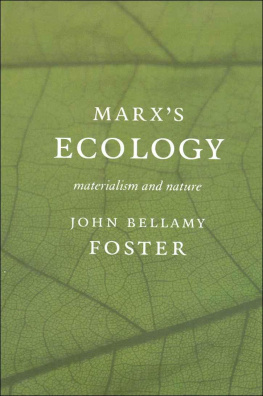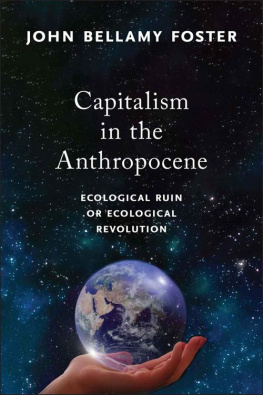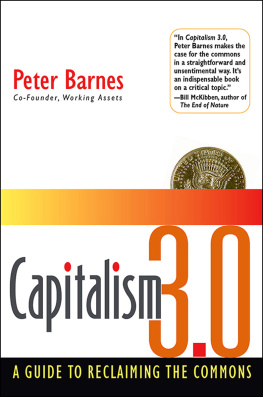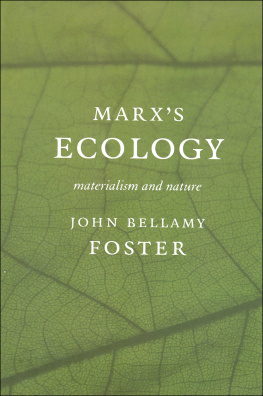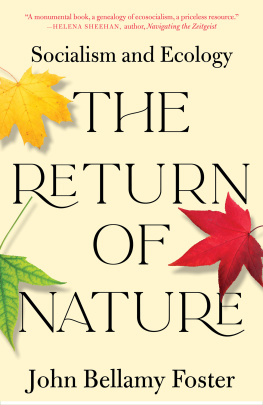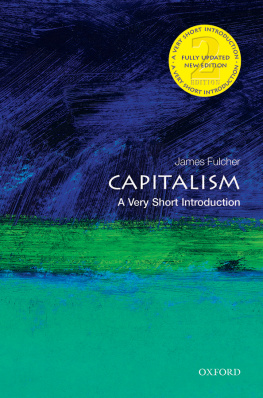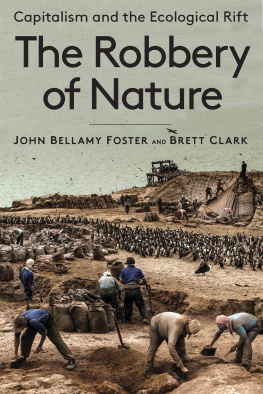
What Every Environmentalist Needs
to Know about Capitalism

What Every Environmentalist Needs to Know about Capitalism
A Citizens Guide to Capitalism and the Environment
Fred Magdoff andJohn Bellamy Foster
Copyright 2011 by Fred Magdoff and John Bellamy Foster
All rights reserved
Library of Congress Cataloging-in-Publication Data
Magdoff, Fred, 1942
What every environmentalist needs to know about capitalism : a citizens guide to capitalism and the
environment / Fred Magdoff and John Bellamy Foster.
p. cm.
Includes bibliographical references and index.
ISBN 978-1-58367-241-9 (pbk. : alk. paper) ISBN 978-1-58367-242-6 (cloth : alk. paper) 1.
Environmental economics. 2. Capitalism. 3. EnvironmentalismEconomic aspects. 4. Environmentalism
Political aspects. 5. Environmental policy. I. Foster, John Bellamy. II. Title.
HC79.E5M329 2011
330.122dc23
2011021515
Monthly Review Press
146 West 29th Street, Suite 6W
New York, New York 10001
www.monthlyreview.org
www.MRzine.org
5 4 3 2 1
Contents
Preface
Wealth, if limits are not set for it, is great poverty.
EPICURUS
Ecological economist Herman Daly is well known for emphasizing what he has called the Impossibility
Theorem of unlimited economic growth in a limited environment. Put concretely, an extension of a U.S.-style
high consumption economy to the entire world of 7 billion peoplemuch less the 9 billion-plus world
population projected for the middle of the present centuryis a flat impossibility. In this book we are
concerned with extending Dalys Impossibility Theorem by introducing what we regard to be its most important
corollary: the continuation for any length of time of capitalism, as a grow-or-die system dedicated to unlimited
capital accumulation, is itself a flat impossibility.
We are constantly being told by the vested interestsand even by self-designated environmentalists and
environmental organizationsthat capitalism offers the solution to the environmental problem: as if the further
growth of capital markets, green consumption, and new technology provide us with miraculous ways out of our
global ecological dilemma. Such views are rooted in an absolute denial of reality, or what John Kenneth
Galbraith has called a system of innocent fraud. In this make-believe, Through the Looking Glass world, the
wondrous workings of markets, perhaps tweaked here or there by regulations and incentives, make miracles
possible. In the process, the laws of physics, chemistry, biology, and ecologyas well as the limits of the earth
are simply conjured away. Fundamental changes in our mode of existence and our lifestyle are not required:
another world is not necessary.
All of this raises questions about what constitutes environmentalism. Today, more people than ever are
convinced that the degradation of the earths life support systems is leading us toward catastrophe. Whether
they are environmental activists or not, growing numbers of people are concerned about the environment and
are taking small steps, and willing to do much more, in order to protect the planet. For all those concerned with
the fate of the earth, the time has come to face facts: not simply the dire reality of climate change and other
forms of environmental destruction, but also that there is a pressing need to change the basic relationships
between humanity and the earth. Put simply, it is essential to break with a system based on a single motive
the perpetual accumulation of capital, and hence economic growth without end. Such a break is a necessary, if
not sufficient, condition for the creation of a new ecological civilization.
This book grew out of an article with the same title, originally published in the March 2010 issue of Monthly
Review. Interest in our article was so great that we were encouraged to expand it into a short book. This brief
work thus is a product of its origins. We have not tried to present a systematic discussion of the entire planetary
ecological crisis, though many aspects of that are touched on here. Rather our goal is to provide a useful introduction to the issue laid out in our title: What Every Environmentalist Needs to Know about Capitalism.
What every environmentalist needs to know, of course, is that capitalism is not the solution but the problem,
and that if humanity is going to survive this crisis, it will do so because it has exercised its capacity for human
freedom, through social struggle, in order to create a whole new worldin coevolution with the planet.
Our personal and intellectual debts in relation to this work are too vast to acknowledge in full. However, we
would like to thank especially Hannah Holleman and Jan Schultz, who aided and assisted us in the preparation
of the present manuscript at various stages of completion.
We would also like to acknowledge the political and intellectual support of those at Monthly Review, Monthly
Review Press, and MRzine, without which this work would have been inconceivable, including: Scott Borchert,
Brett Clark, Susie Day, Yoshie Furushashi, John Mage, Martin Paddio, John Simon, Victor Wallis, and Michael
Yates.
Some of our close friends, colleagues, and students have contributed to our understanding of ecological
issues in ways that have impacted this book: including Matthew Clement, Cade Jameson, R. Jamil Jonna, Brian
Tokar, Ryan Wishart, and Richard York.
During the last two years, while working on the ideas in this book, we have traveled to Bolivia, Brazil,
China, Venezuela, and Vietnam to discuss ecological issues. We are thus constantly reminded that the ecological
movement is a planetary one. We would like to thank the many individuals from many different cultures that
we have encountered in these journeys.
Finally, we would like to offer our heartfelt thanks to Amy Demarest and Carrie Ann Naumoff, with whom
we share our lives on this earth and our struggles for a sustainable future.
JUNE 5, 2011
FLETCHER, VERMONT
EUGENE, OREGON
1. The Planetary Ecological Crisis
Let us not, however, flatter ourselves overmuch on account of our human victories over nature. For
each such victory nature takes its revenge on us. Each victory, it is true, in the first place brings about the
results we expected, but in the second and third places it has quite different, unforeseen effects which only
too often cancel the first .
FREDERICK ENGELS
Environmental degradation is not new to todays world but has occurred throughout recorded history with
profound negative consequences for a number of ancient civilizationsmost notably Mesopotamia and the
Maya, which experienced major collapses due to what are believed to be ecological causes. Problems with
deforestation, soil erosion, and salinization of irrigated soils were present throughout antiquity. Commenting on
the ecological destruction in ancient Greece Plato (c. 427347 BCE) wrote in Critias:
What proof then can we offer that it [the land in the vicinity of Athens] is now a mere remnant of
what it once was? You are left (as with little islands) with something rather like the skeleton of a body
Next page

